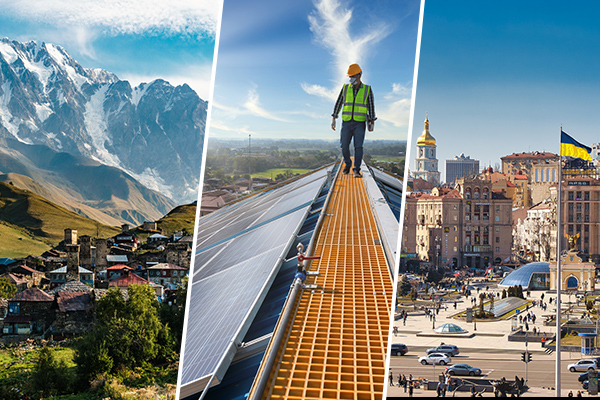
There are three images in one. On the left, a mountain village in Georgia. In the middle, a worker with solar panels. On the right, Kyiv city centre.
The climate engagement between the EU and its neighbouring countries in Europe goes beyond dialogue and cooperation and translates into the promotion of the alignment with EU climate legislation acquis.
Through the European Economic Area Agreement, the EU has extended large parts of its climate acquis, including the EU Emission Trading System (ETS) Directive, the Effort Sharing Regulation and the LULUCF Regulation, to Norway, Iceland and Liechtenstein. Similarly, the incorporation of the EU climate acquis is one element of the ongoing negotiations of the association agreements with Andorra and San Marino.
In the context of the enlargement process, candidate countries are also to align their legal framework with the EU legislation and standards, including on climate action.
Separate from the EU accession negotiations, the Western Balkans, Ukraine, Moldova and Georgia are supported through the Energy Community. In this context, the alignment with the EU legislation is guided by the Energy Community’s Decarbonisation Roadmap. Since the roadmap’s adoption in 2021, progress has been made on Monitoring, Reporting and Verification (MRV) of greenhouse gas emissions and 2030 energy and climate targets. Carbon pricing is also an important topic of engagement.
Beyond the alignment with EU legislation, the EU is also deepening its climate engagement with countries in its wider neighbourhood through other frameworks.
In April 2023, a Green Alliance was signed with Norway to allow for privileged cooperation on climate action, clean energy, industrial transformation and environmental protection. Clean hydrogen, renewables (especially offshore wind), carbon capture and storage, as well as critical raw materials are central in this alliance.
With Türkiye, a High-Level Dialogue on climate-related issues started in 2021, with two operational working groups set up: one on carbon pricing to support the development of an ETS in Türkiye and one on adaptation.
Following Russia’s war against Ukraine, the EU is also promoting green reforms, as well as green reconstruction and modernisation of Ukraine bilaterally, within the Eastern Partnership and the Energy Community.
